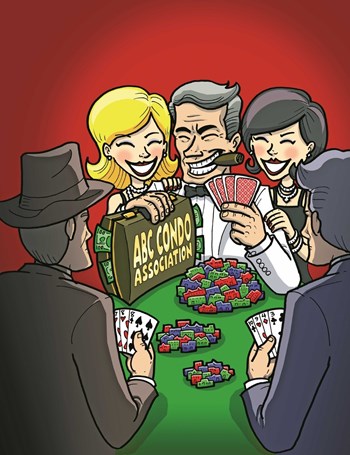
Given recent headlines, condo associations could be forgiven for thinking they need to put an armed guard and razor wire around the petty cash box. A wave of fraud appears to be hitting condominiums from New England to Florida and beyond.
A bookkeeper in Maine was charged with stealing $30,000 from two different condo associations. In Connecticut, a former business manager – whom police allege had a gambling problem –pleaded not guilty to stealing $226,000 from a condo association in Ledyard. In New York last December, a Rockland County treasurer pleaded guilty to taking more than $130,000 from an association. Perhaps the largest case of fraud reported in recent months is that of a New York manager who allegedly stole $1.3 million in property taxes from six co-ops.
“It’s all over the country – it isn’t just condo boards and associations,” says Michael Kessler, a certified fraud accountant and owner of Kessler International in New York. “The amount of fraud that we see is just astronomical.” (If it’s any comfort, someof Kessler’s cases make the co-op theft look like chump change. His firm recently broke open a Ponzi scheme worth $463 million.) But “condos and co-ops are up there,” he says.
That leaves associations and boards having to grapple with an uncom-fortable situation in this struggling economy. Fraud can devastate a small condominium’s finances and leave boards of all sizes feeling violated and distrustful. But how can an association tell if there’s a problem without feeling like they’re suspecting everyone in their employ?
Three Scenarios
Take three hypothetical scenarios andsee if you can spot the most likely thief: An employee has been heading for Mohegan Sun Casino on weekends. The treasurer just traded in his 10-year-old Honda Civic for an Audi TT. And then there’s the dedicated bookkeeper, who’s been with the company 20 years and never, ever takes a vacation.
Actually, all three scenarios are red flags, say certified fraud examiners.
Every person interviewed mentioned employees who won’t take time off as a serious warning sign. “Beware the overly dedicated employee,” says Michael Tulman, a forensic bookkeeper in Boston.
“The most common phrase I hear is: ‘I can’t believe it’s old Bob. He’s been with us forever. He takes in kittens,’ ” says Allan Bachman, education manager for the Certified Fraud Examinersin Austin, Texas. “Meanwhile, he’s been skimming from the company forever.”
While a drug- or substance-abuse problem might be easy to spot, there are usually other indications that an employee is stealing.
“They aren’t putting [the money] in a coffee can and burying it in the backyard,” says Bachman.
Big-ticket purchases – expensive clothes, luxury vacations, or new cars (any item that seems just a little beyond one’s means) – might be cause for concern. Employees who are reluctant to let others see their work or to be audited are another possible red flag. Taken singly, these behaviors might not mean anything, says Bachman. But cumulatively, they could.
With more people on the ropes financially, it’s not surprising that more people are tempted to steal. “In this economy, people are desperate,” says Tulman.
But part of the increase in fraud cases may also stem from the fact that businesses are much more watchful of their money than during boom times – and so some long-running instances of fraud are being brought to light. (Bernie Madoff, for example, had a 30-year run.)
“When the economy’s bad, that’s when businesses start looking for all their pennies,” says Kessler, who cites cases he’s working on right now that go back a decade. “Fraud doesn’t get recognized until somebody needs the money.”
“We can assume fairly logically that the economy would have direct effect on fraud,” says Bachman. “But I can make a case that an ‘up’ economy would lead to more fraud: There’s more money to steal.”
He believes that both factors – more temptation on the part of employees and more scrutiny on the part of employers –are contributing to the rise in reported cases.
“The idea is to put checks and balances in to take away that temp-tation,” says Tulman. “You need to eliminate the feeling of, ‘Oh, they won’t even miss it.’ ”
Checks and Balances
Among safeguards that condominiums could institute: Have two people sign off on checks over a certain amount. Don’t let the same person who pays the bills sign the checks and reconcile the bank statements. Don’t use a signing stamp, a handy little device that saves time for both a board president and forany potentially dishonest employee. Keep employee credit-card balances low and check statements regularly. Don’t just give the treasurer reports – have him or her look at the whole package, from canceled checks and invoices to cash receipts.
Oh, and another thing: “Don’t accept cash for condominium fees,” says Tulman.
“It isn’t difficult to steal – you want to make it complicated,” he says. “Youwant to put obstacles in the way. Give people the sense that they are going to get caught.”
Kessler also recommends associations check their insurance and theft protection. “Make sure all your employees are bonded,” he says. “Spend the extrafew dollars and get the best coverage you can.”
And those safeguards should start before an employee is on the payroll.
“Don’t spend $29.99 and think you’ve got a background check,” says Kessler. Depending on state employment laws, he recommends associations do a criminal background check, a financial background check, and research public records in other states. “If you’re entrusting someone with $1 million of someone else’s money, you better do a good background check.”
Many people elected to a condo board don’t have a background in accounting, Kessler adds. “I would suggest the board appoint somebody who’s financially savvy to keep watch. You need watchdogs.”
Potentially any employee has an opportunity to steal, whether it’s a maintenance employee who’s ordering extra supplies and selling them on the side or an office manager who uses her employee credit card to gas up her car.
Fake Invoices for Work Never Done
One common scenario Bachman sees with condominiums is a false billing scheme, where employees send in invoices for consulting or work that was never done. All it takes is a computer, says Bachman, to create a fake business and some fake letterhead.
“In a large company, if there are hundreds of vendors, hundreds of repairmen coming through, one or two fake invoices snuck through are not going to raise a red flag,” he says.
That’s where association oversight is important: If the ABC Carpet CleaningCo. is No. 10 on your list of biggest vendors and nobody remembers the carpets being cleaned, it’s probably time to call in a fraud examiner.
Even if everything seems fine, a regular audit of the books is a good idea. And don’t explain away small bookkeeping mistakes by shrugging and saying, “Oh, that account’s never right.”
“In the early stages, fraud and stupidity look a lot alike,” says Bachman.
While both large and small condos are vulnerable to fraud, experts say, the effects can be more devastating for small condos. Also, since everyone knows everyone else, sometimes fraud can be painful to uncover.
Let’s say the board president’s home is “just a little nicer” than everybody else’s, says Tulman. Or an electrician puts in a bid and is told he can get the job if he does some work on the president’s unit. “I lived in one place where that happened. I confronted the board president – it was like a war,” says Tulman.
Whistleblowers are the No. 1 way fraud is uncovered, says Bachman. Audits are No. 2.
Trust your gut. If you suspect somethingis wrong, it’s worth getting a professional in to examine the books. Kessler says that usually, if someone gets up the nerve to call in a firm like his, there’s something to be found. But there are cases when “sometimes it’s just sloppy bookkeeping,” he says.
“You really want to just be alert and aware,” says Bachman. “Simple explanations might just be explanations, but they might be coverups to a larger problem.”
Yvonne Zipp is a freelance writer and a frequent contributor to New England Condominium magazine.






Comments
Leave a Comment